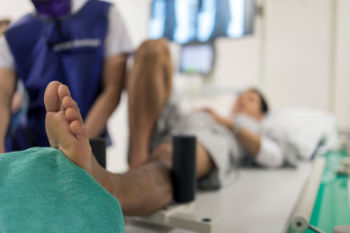
Stress fractures are tiny cracks in the bone that often result from repetitive force rather than a single injury. While athletes and runners frequently experience them, anyone can be at risk. Individual factors, such as low bone density, poor nutrition, or hormonal imbalances, may weaken the skeleton and make it more vulnerable. Foot shape, including flat feet or high arches, can also increase stress on certain bones, raising the chance of a fracture. Training habits play a major role as well. Sudden increases in activity, running on hard surfaces, or wearing unsupportive shoes can overload the bones before they adapt. Insufficient rest between workouts further compounds the problem, leading to breakdown instead of repair. If you suspect a stress fracture, do not push through the pain. It is suggested that you see a podiatrist for an accurate diagnosis, appropriate treatment, and guidance on safer training practices.
Activities where too much pressure is put on the feet can cause stress fractures. To learn more, contact one of our podiatrists from Pennsylvania Foot & Ankle. Our doctors can provide the care you need to keep your pain free and on your feet.
Dealing with Stress Fractures of the Foot and Ankle
Stress fractures occur in the foot and ankle when muscles in these areas weaken from too much or too little use. The feet and ankles then lose support when walking or running from the impact of the ground. Since there is no protection, the bones receive the full impact of each step. Stress on the feet can cause cracks to form in the bones, thus creating stress fractures.
What Are Stress Fractures?
Stress fractures occur frequently in individuals whose daily activities cause great impact on the feet and ankles. Stress factors are most common among:
- Runners
- People affected with Osteoporosis
- Tennis or basketball players
- Gymnasts
- High impact workouts
Symptoms
Pain from the fractures occur in the area of the fractures and can be constant or intermittent. It will often cause sharp or dull pain with swelling and tenderness. Engaging in any kind of activity which involves high impact will aggravate pain.
If you have any questions please contact one of our offices located in Bensalem, Philadelphia, Northeast Philadelphia, Yardley, PA, and Hamilton, NJ . We offer the newest diagnostic and treatment technologies for all your foot and ankle needs.
